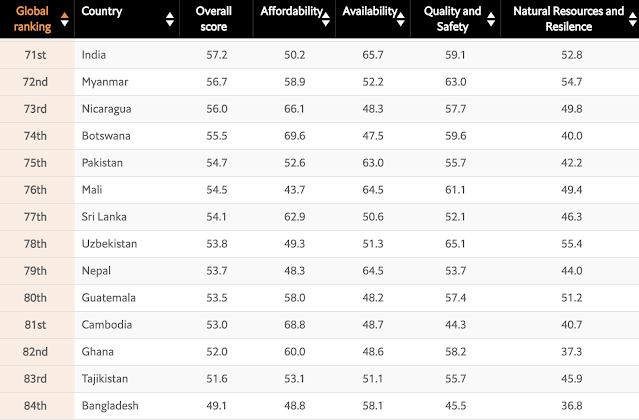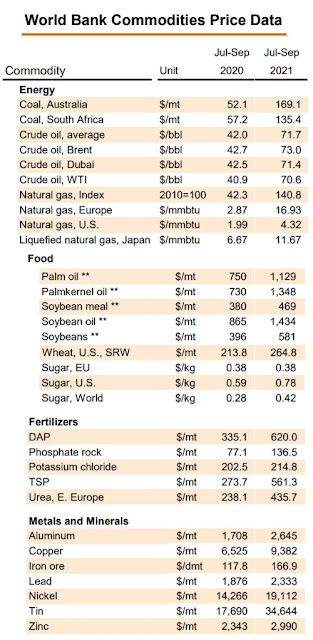PakAlumni Worldwide: The Global Social Network
The Global Social Network
Global Food Security Index 2021: Food in Pakistan More Affordable Than India, Bangladesh, Nepal
Food is more affordable in Pakistan than in Bangladesh and India, according to the Global Food Security Index 2021. Earlier in 2021, Global Hunger Index report also ranked Pakistan better than India. Numbeo Grocery Index reports that the food prices in Pakistan are the second cheapest in the world.
 |
| Global Food Security Index 2021. Source: Economist |
 |
| History of Inflation in Pakistan. Source: Statista |
 |
| Hunger Trends in South Asia. Source: Global Hunger Index |
 |
| Monthly Minimum Wages Comparison. Source: ILO |
Related Links:
Haq's Musings
South Asia Investor Review
Pakistan Among World's Largest Food Producers
Food in Pakistan 2nd Cheapest in the World
Pakistan's Pharma Industry Among World's Fastest Growing
Pakistan to Become World's 6th Largest Cement Producer by 2030
Pakistan's 2012 GDP Estimated at $401 Billion
Pakistan's Computer Services Exports Jump 26% Amid COVID19 Lockdown
Coronavirus, Lives and Livelihoods in Pakistan
Vast Majority of Pakistanis Support Imran Khan's Handling of Covid1...
Pakistani-American Woman Featured in Netflix Documentary "Pandemic"
Incomes of Poorest Pakistanis Growing Faster Than Their Richest Cou...
Can Pakistan Effectively Respond to Coronavirus Outbreak?
How Grim is Pakistan's Social Sector Progress?
Pakistan Fares Marginally Better Than India On Disease Burdens
Trump Picks Muslim-American to Lead Vaccine Effort
Democracy vs Dictatorship in Pakistan
Pakistan Child Health Indicators
Pakistan's Balance of Payments Crisis
Panama Leaks in Pakistan
Conspiracy Theories About Pakistan Elections"
PTI Triumphs Over Corrupt Dynastic Political Parties
Strikingly Similar Narratives of Donald Trump and Nawaz Sharif
Nawaz Sharif's Report Card
Riaz Haq's Youtube Channel
-
Comment by Riaz Haq on November 15, 2021 at 8:05pm
-
#India’s wholesale price-based #inflation (WPI) in October rose to 12.54% from the previous month's 10.66%, remaining in double-digits for the seventh month in a row, government data showed on Monday. | Reuters
https://www.reuters.com/world/india/indias-oct-wpi-inflation-accele...
India's annual wholesale price-based inflation, a proxy of producers' prices, accelerated in October to a five-month high, pushed up by increases in fuel and manufacturing prices, fuelling concerns of rising inflationary pressures for firms.
The gap between retail and wholesale price-based inflation has widened in recent months as many companies and retailers are still trying to absorb galloping input costs that threaten to hit their bottom lines.
Annual wholesale price-based inflation (INWPI=ECI) in October rose to 12.54% from the previous month's 10.66%, remaining in double-digits for the seventh month in a row, government data showed on Monday.
Consumer prices based inflation, the main gauge monitored by the monetary policy committee of Reserve Bank of India, rose 4.48% in October from the same month last year, speeding up from September's 4.35%, separate data released on Friday showed.
Economists said the recent cut in fuel tax rates by the government could lower pressures on households and companies in the short-term, but firms are trying to pass on rising costs as domestic demand picks up.
In the April-June quarter, the economy grew an annual 20.1%, and the central bank expects GDP to expand 9.5% in the current fiscal year ending in March 2022.
Wholesale fuel and power prices rose 37.18% in October year-on-year compared with 24.81% in September, while manufactured product prices rose 12.04% compared with 11.41% in the previous month, data showed.
Wholesale prices of food accelerated at a 3.06% pace in October from a year earlier compared with 1.14% in the previous month.
The RBI's monetary policy committee is scheduled to meet Dec. 6-8 and is widely expected to leave the repo rate unchanged at 4%.
-
Comment by Riaz Haq on November 15, 2021 at 8:08pm
-
'High inflation: no room for excuses': MoF clarification - Pakistan - Business Recorder
https://www.brecorder.com/news/40133523
Average core inflation during PTI first three years has recorded at 6.9% vs headline inflation 8.8%. If we compare with PML (N)'s average core inflation (6.0%) it was much higher than headline inflation (4.82%). This indicates that the competitiveness during PMLN was compromised as reflected from higher trade deficits due to contraction in export growth (2014-18).
While PPP stand out in headline, core and food inflation with record double digit witnessed in all categories- Headline inflation (13.82%), Core (11.4%), and Food (15.48%). Food inflation in PTI term is question marked and perhaps the only factor which is eating up the PTI political capital in last three years.
Logically, speaking the food price hike is linked with country's food security; PMLN has destroyed the country's comparative advantage of being agricultural country, through serving its vested interests. It is pertinent to note that average agriculture growth (2.18%) during PMLN were lowest since 1990s and even worst when we just focus on crop growth statistics (0.68%).
Agriculture crop growth recorded lowest in PMLN term- Average 0.68%, PPP 1.33% & PTI 1.76%. Despite the locust attack, the PTI government has successfully turned around the crop sector through incentivizing the farmers via attractive support prices, cheaper inputs, and timely payment of crops. Moreover, the focus has further sharpened by issuing the Kissan cards and loans to farmers.
Going forward, we are expecting bumper Kharif crops, and this will add huge sum to rural economy, never seen in last 13 years. Below is the crops target for FY22 and from where PTI took over.
Similarly, PTI government has been wrongly blamed for crisis in the energy sector. Under its belt, it has the credit to negotiate the IPP deals of 1994 & 2002 policies. This has saved hundreds of billion rupees. Despite Covid, Government has managed to bring the circular debt in FY21 to just Rs130 bn from more than Rs 450bn. Currently, the bigger issue for country is going through the excess capacity committed by PML-N government on 'Take or Pay' basis.
This has accumulated the huge capacity payments and in turn circular debt. Number of measures is already in place to improve the electricity consumption, but one cannot avoid the higher tariff to mitigate the looming power crisis.
We are confident of dealing with the structural deficit of the country, but it requires the exogenous crisis to stem first. Not to forget, we had to deal with default risk, higher deficits, threat from India, Covid, and off late Afghan issue and global inflation woes just in last 36 months, but even then, we manage to bring growth back on track.
Lastly, to protect the vulnerable, a relief package of Rs. 120 billion is announced to provide 30 percent discount on ghee, flour, and pulses to 130 million people for next six months. This is over and above of budgetary allocation for FY 2021-22 for EHSAS Program of Rs. 260 billion.
-
Comment by Riaz Haq on November 20, 2021 at 6:44pm
-
2020 labor force participation rate in Pakistan is 50.2%, higher than India's 46.3% but lower than Bangladesh's 55.7%.
https://www.ceicdata.com/en/indicator/india/labour-force-participat...
https://www.macrotrends.net/countries/PAK/pakistan/labor-force-part...
https://www.macrotrends.net/countries/IND/india/labor-force-partici...
-
Comment by Riaz Haq on November 20, 2021 at 6:46pm
-
How happy or miserable are we? - Newspaper - DAWN.COM
Inbox
https://www.dawn.com/news/1657633
The simple misery index has been modified by other economists like Robert Barro of Harvard and recently by Steve Hanke of Johns Hopkins University. In Hanke’s formulation lending rates are added because higher lending rates cause misery. Growth in real per capita GDP is subtracted as it causes happiness. This formulation helps make a country by country comparison easier. Hanke has calculated this index for 156 countries for 2020 and ranked these countries from the most to the least miserable.
Venezuela ranks first (most miserable) and its neighbour, Guyana ranks 156 (least miserable or most happy). Why was Guyana most happy in 2020? It struck oil in 2019 and as a result, real GDP per capita increased by 25.8pc in 2020. Next to Venezuela in misery are Zimbabwe and Sudan. And next to Guyana in happiness are Taiwan and Qatar. As we are always obsessed with comparisons with India, it may not hurt us to know that India is higher in misery (index 35.8, rank 39) than Pakistan (index 32.5, rank 49.) Bangladesh is better than both India and Pakistan with a misery index of 14 and rank of 129.
-
Comment by Riaz Haq on December 14, 2021 at 2:00pm
-
Budget 2021-22: Minimum wage increased from Rs17,500 to Rs20,000
Salaries and pensions increased by 10%
https://www.samaa.tv/money/2021/06/budget-2021-22-minimum-wage-incr...
The government has increased the minimum wage from Rs17,500 per month to Rs. 20,000.
Federal Finance Minister Shaukat Tarin on Friday presented the budget for the next financial year 2021-22.
Introducing the budget, the Finance Minister said that low-income earners have been affected more by inflation. In order to reduce the burden of inflation, the minimum wage has been increased from Rs. 17,500 to Rs20,000 per month.
The finance minister said that the salaries of government employees are being increased by 10% and the pensions of retired employees will be increased by 10% from July 1.
--------------
In purchasing power parity terms, one PPP US$ is equal to about PKR 40.
So Rs 20,000 per month minimum wage translates to $500 in PPP terms.
-
Comment by Riaz Haq on December 14, 2021 at 2:04pm
-
Budget 2021-22: Minimum wage increased from Rs17,500 to Rs20,000
Salaries and pensions increased by 10%
https://www.samaa.tv/money/2021/06/budget-2021-22-minimum-wage-incr...
The government has increased the minimum wage from Rs17,500 per month to Rs. 20,000.
Federal Finance Minister Shaukat Tarin on Friday presented the budget for the next financial year 2021-22.
Introducing the budget, the Finance Minister said that low-income earners have been affected more by inflation. In order to reduce the burden of inflation, the minimum wage has been increased from Rs. 17,500 to Rs20,000 per month.
The finance minister said that the salaries of government employees are being increased by 10% and the pensions of retired employees will be increased by 10% from July 1.
--------------
In purchasing power parity terms, one PPP US$ is equal to about PKR 40.
So Rs 20,000 per month minimum wage translates to $500 in PPP terms.
Comment
- ‹ Previous
- 1
- 2
- Next ›
Twitter Feed
Live Traffic Feed
Sponsored Links
South Asia Investor Review
Investor Information Blog
Haq's Musings
Riaz Haq's Current Affairs Blog
Please Bookmark This Page!
Blog Posts
EU-India Trade Deal: "Uncapped" Mass Migration of Indians?
The European Union (EU) and India have recently agreed to a trade deal which includes an MOU to allow “an uncapped mobility for Indian students”, according to officials, allowing Indians greater ease to travel, study and work across EU states. India's largest and most valuable export to the world is its people who last year sent $135 billion in remittances to their home country. Going by the numbers, the Indian economy is a tiny fraction of the European Union economy. Indians make up 17.8%…
ContinuePosted by Riaz Haq on January 28, 2026 at 11:00am — 8 Comments
Independent Economists Expose Modi's Fake GDP
Ruling politicians in New Delhi continue to hype their country's economic growth even as the Indian currency hits new lows against the US dollar, corporate profits fall, electrical power demand slows, domestic savings and investment rates decline and foreign capital flees Indian markets. The International Monetary Fund (IMF) has questioned India's GDP and independent economists…
ContinuePosted by Riaz Haq on January 25, 2026 at 4:30pm — 10 Comments
© 2026 Created by Riaz Haq.
Powered by
![]()

You need to be a member of PakAlumni Worldwide: The Global Social Network to add comments!
Join PakAlumni Worldwide: The Global Social Network